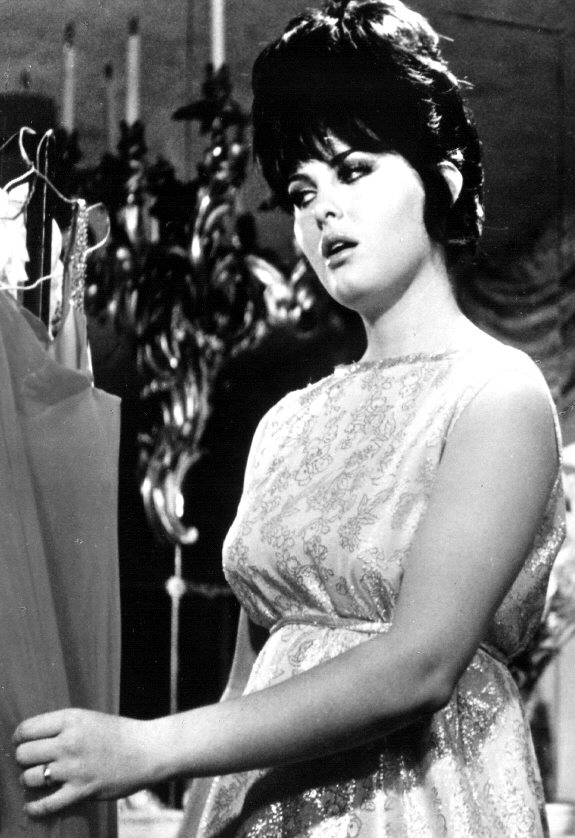Una mujer para los sábados
[A Woman for Saturdays]
(Panamerican Films, 1968) Prod/Dir/Scr: Manuel Zeceña Diéguez; Orig. Play: Federico Inclán; Photo: Juan Manuel Herrera; Theme Song: Arturo Castro; Prod Mgr: Manuel Zeceña Jr.; Film Ed: Alfredo Rosas Priego; Camera Op: Pedro Vázquez, Dioncio Juárez; Re-rec: Salvador Topete; Sound Ed: Abraham Cruz
CAST: Julio Alemán (Javier Lozano), Tere Velázquez (Gabriela Alarcón), Amedee Chabot (Luisa), Arturo Castro (Jacobo "Chicuco" Schneider), Velda González (Valeria, maid), Angel Cazarín (Pierre), Laura Nell [aka Anel] (Medea, maid), Pedro Vázquez (hotel manager)
NOTES: this adaptation of a stage play was shot on location in the Dominican Republic, but makes absolutely no use of "local color." Producer Manuel Zeceña Diéguez began making films in the early '60s outside Mexico--but using mostly Mexican casts and crews--probably for budgetary reasons. This film takes place almost entirely inside and on the grounds of a house and in and around the Hotel Embajador, and while these are satisfactory and attractive enough, the picture could have been made in literally any country.
Javier goes to meet Gabriela, with whom he has been corresponding romantically. They have fallen in love via long distance. He is surprised to discover that she is a young and attractive woman; likewise, she is shocked to discover that he is handsome. Luisa, Gabriela's friend, accidentally reveals the fact that Gabriela is a "kept woman," whose expenses are paid by Chicuco, a rich Jewish man who only visits her on Saturdays. Javier storms out, but love conquers all, and he comes back and marries Gabriela. They each confess that they were hoping to find a rich mate via correspondence, and now they have to find a way to survive. Chicuco, tipped off by Gabriela's maid, discovers Javier and withdraws his financial support.

Javier gets a job selling life insurance, but the only rich man he knows is Chicuco (Javier says the insurance company is picky about their clients: they don't want poor people, sick people, or old people). Gabriela tries to convince Chicuco to buy an insurance policy in her favor, but Chicuco tricks Javier and gets him in trouble with his boss. Chicuco then proposes a menage a trois ("like in vaudeville"), where he will continue to support Gabriela but allow her to remain married to Javier; and if Javier objects, they just won't tell him!
Luisa, with the aid of dress designer Pierre, manages to attract Chicuco's attention, so he decides to make her his mistress as well. Javier displays singing talent and is hired by the swanky Hotel Embajador, at least partly through Chicuco's influence. The End.
Una mujer para los sábados is very obviously adapted from a play. Although Zeceña Diéguez tries to liven things up by having his characters walk around, even moving scenes outdoors in natural locations, he cannot disguise the fact that the picture is basically a string of long dialogue scenes between 2 or 3 people. The insurance-sale sequence is good example. It takes place outside of the Hotel Embajador, around the swimming pool. Javier and Gabriela come to see Chicuco; they sit around a table and talk. Javier calls his boss on the telephone and then leaves to see him. Gabriela and Chicuco stroll around the pool, sit down somewhere else, and talk. Gabriela gets a phone call telling her Javier has been hurt; she leaves. Chicuco runs into Pierre, they talk! The whole film is like this, with the exception of two interpolated songs near the end of the film (Javier sings one in the shower and one in front of some fountains). The fact that Una mujer para los sábados was shot entirely on location does not thing to hide its stage origins.
The acting isn't bad. Julio Alemán and Tere Velázquez have to struggle against their characters' innate unlikeability: Javier is sappy and inept, Gabriela is self-centered and self-pitying. Arturo Castro (who also wrote the theme song) was dealt a better hand by the script, since Chicuco is a more interesting character; however, Castro's attempt at a Jewish-Middle Eastern accent comes and goes. Amedee Chabot, wearing a brunette wig (probably to set her apart from the blonde Velázquez) is attractive and animated in a good supporting role. Her dialogue is dubbed, as usual, although one can see by her lip movements that she was speaking her lines in Spanish. Angel Cazarín is adequate as a stereotypical effeminate, French dress designer.
Una mujer para los sábados is basically harmless, but it does have an "adult" plot and dialogue and Zeceña Diéguez included a few mildly risqué shots to spice it up: there is no frontal nudity, but Amedee Chabot is seen nude from the waist up (from behind), and there is implied nudity of Velázquez and Alemán in a bedroom scene.
Not particularly good or bad, Una mujer para los sábados does at least give one some idea of what a light "sexy" stage comedy of the era would have been like.
Reviewed in The Mexican Film Bulletin Vol. 18 No.2
Back to the Amedee Chabot Page
Review posted 2 Nov 2000 by D. Wilt (dw45@umail.umd.edu)